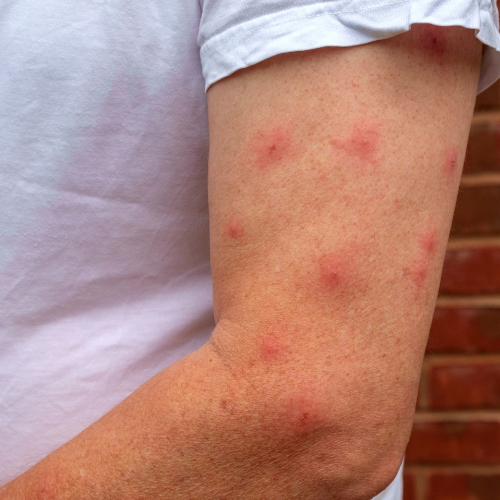About Vectors
Vectors are biting insects and arachnids like mosquitoes, ticks, fleas, and lice that can spread germs that make people sick. The diseases caused by vectors are major causes of death. Read to learn how you can help prevent mosquito and tick bites!
For the Public
Everyone is at risk of being bitten by mosquitoes and ticks and getting sick from the germs they can spread. This is why it is important to take precautions to avoid serious illness.
How you can protect yourself and your loved ones from mosquito and tick bites.
Mosquitoes can bite year-round and are usually most active during dawn and dusk in the warmer months. Ticks are most active during the spring, summer, and fall, but in warmer areas may be active all year round.
When in areas where mosquitoes and ticks are common, make sure to do the following:
- Wear an EPA-registered mosquito and tick repellent that contains:
- DEET for use on skin.
- 0.5% permethrin for use on the outside of your clothing.
- Oil of Lemon Eucalyptus (OLE), a plant-derived ingredient.
- Dress appropriately for the weather AND the season:
- Wear light-weight, loose-fitting long sleeves and long pants as mosquitoes can bite through thin clothing.
- Wear light-colored, light-weight, loose-fitting long sleeves and long pants to see ticks better.
- Tuck your shirt into your pants and tuck your pants into your socks and boots to cover exposed skin.
- Dump all standing water or treat standing water with EPA-registered water treatments.
- After coming inside from outdoors, check for mosquito bites or ticks.
When avoiding ticks specifically, it’s important to:
- Spend less time in tall grass and shrubs.
- Reduce leaf litter and mow tall grass or brush that may serve as a tick habitat.
How to protect your pets from mosquito and tick bites.
Animals like dogs, cats, and horses can also get sick from mosquitoes and ticks. To keep your pet safe from potential illness, you can:
- Stay up to date on your pet’s vaccines and illness prevention measures.
- Make sure to check them for ticks when they come inside and remove ticks immediately if found.
Ask your veterinarian about heartworm prevention, mosquito and tick prevention, and the Leptospirosis vaccine for cats and dogs. For horses, ask your veterinarian about vaccines that protect your horse against Eastern Equine Encephalitis (EEE), West Nile Virus, and Leptospirosis.
For Healthcare Providers
It’s important to educate patients on personal protective measures to prevent mosquito and tick bites. It’s also important to know what to do in case illness occurs. See vector-borne illness and disease guidance for healthcare providers below.
CDC Parasitic Diseases Hotline*
Main Hotline (Monday–Friday, 8 am-4 pm ET) — 404.718.4745
After Hours Hotline – 770.488.7100
Email – parasites@cdc.gov
*This hotline is for all non-malaria parasitic diseases.
CDC Malaria Hotline
Main Hotline (Monday-Friday, 9 am-5 pm ET) – 770.488.7788 or 1.855.856.4713 (toll-free)
After Hours Hotline – 770.488.7100
E-mail – malaria@cdc.gov
CDC Provider Resources
Evaluating and Diagnosing Malaria
General Approach to Malaria Treatment
Treatment Tables for Malaria in the U.S.
Diagnosing and Treating Malaria in the U.S.
How to Report Vector-Borne and Other Notifiable Diseases
There are three ways to report vector-borne diseases and other notifiable diseases: electronically, by phone, or by fax. See below for more information.
Electronically
SendSS – Georgia State Electronic Notifiable Disease Surveillance System
By Phone
GNR Epi On Call (Monday through Friday, 8 am to 5 pm): 770.339.4260, press 0, and ask for Epi On Call.
After Hours GNR Epi on Call — 404.323.1910
Georgia DPH Hotline (24/7) — 1.866.PUB.HLTH (1.866.782.4584)
By Fax
Fax* the Notifiable Disease Conditions Report Form to GNR – 888.979.8335
*For immediately notifiable diseases, you must give a verbal report in addition to the electronic/faxed form.
Additional Resources
Infection Control at GNR Public Health
About Vector-Borne Illnesses and Diseases






